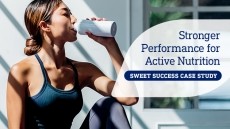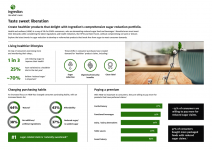Artificial sweetener market driven by obesity concerns
growth for the global artificial sweetener market. according to a
new report.
Published by Global Industry Analysts, Artificial Sweeteners: A Global Strategic Business Report reveals that a worldwide weight reduction effort is stimulating the $3.5bn global artificial sweeteners market, of which the US and Europe currently make up 65 per cent. According to the report, the global sweetener market is currently achieving a compound annual growth rate of 3.7 per cent. Other key factors driving the market include attempts to create foods for diabetic patients, a growing number of people wanting to cut sugar intake, worries regarding dental care, and an increase in production of diet foods and beverages, said Global Industry Analysts. Breaking the category down, the global market for sucralose artificial sweeteners will allegedly grow the fastest, posting a CAGR of around 10 per cent. This will be followed by the aspartame-based artificial sweetener market, which will most likely reach above and beyond the $3bn mark in 2008, expanding on its current 50 per cent hold of the global market. However, a category not faring so well is that of the saccharin artificial sweetener market, which the report claims could be linked to a study conducted in the 1960's that found high doses of the ingredient caused bladder cancer in laboratory rats. Nevertheless, over 90 nations, including Canada, approve restricted level use of the sweetener following various studies conducted from 1977 to 1991. However, many nations have banned saccharin-based sweeteners altogether. In the US, the Food and Drug Administration (FDA) continues to approve the use of saccharin, along with four other sweeteners: sucralose, aspartame, acesulfame K and neotame. It is also reviewing two new low-calories sweeteners, alitame and cyclamate -opening up the global market for further competition, price erosion and distributed customers. In terms of sweetener usage, new-age beverages, dairy products, salad dressings and salty snack foods are representing the fastest expanding markets for the sugar substitutes industry. Major players in the market include Nutrasweet, Tate & Lyle, Nutrinova, Merisant, McNeil Nutritionals, Danisco, Spherix and Imperial Sugar. Despite the anticipated developments in the market, many food and beverage companies globally are said to be steering towards a health and wellness trend, replacing 'artificial' ingredients, such as colours and sweeteners, with ingredients considered more 'natural'. Likewise, a report by the Freedonia Group published earlier this year claimed that an expected increase in overall high intensity sweeteners volume will result in the market seeing falling prices, as patent protections expire and new competitors - especially importers based in developing nations - enter the marketplace. High intensity sweeteners are expected to remain the largest product category through 2010 due to their leadership position in diet soft drinks and tabletop uses, which are among the main applications for alternative sweeteners. In diet soft drinks, aspartame and acesulfame potassium (ace-K) are forecast to remain the leading products, due to their use in many of the top brands. Prices for the two products are forecast to decline by around 1-2 percent annually over the next few years, a "gentle erosion" compared to the high single-digit declines that occurred after their patent protections fell off. Although not yet a significant threat to aspartame's dominant position in diet soft drinks, sucralose has become the leader in the key tabletop sweetener market, said the report. According to Freedonia, sucralose, the main sweetener in Tate & Lyle's well-known Splenda product, has grown from niche status to "market powerhouse" in just a few years since its Food and Drug Administration (FDA) approval for use as a general sweetener.





















